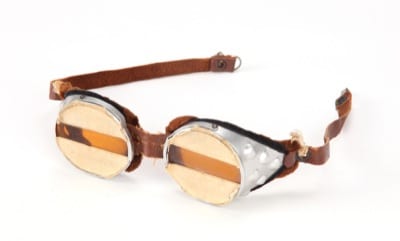Profiles in History, an auctioneer of Hollywood memorabilia, has landed Amelia Earhart’s original flight goggles worn during her historic 1932 record-breaking solo transatlantic flight. The flight set several aeronautic records: the first person to cross the Atlantic twice, first woman to fly solo nonstop across the Atlantic, and the fastest transatlantic flight, beating Lindbergh by 18 hours, which cemented her celebrity and led to her 1934 TransPacific flight and her doomed around-the-world attempt in 1937. These goggles were on loan to and exhibited in the Earhart case next to her Lockheed Vega at the Smithsonian National Air and Space Museum from 1993-98.
The goggles, a special addition to Profiles in History’s Oct. 8-9 auction, have an estimated sale price of $100,000-$150,000. Worldwide bidding begins at noon both days and can be placed either in person, via mail, phone, fax or live on the Internet
 “These goggles are the single most important flight-worn aviation artifact to ever be offered at public auction,” said Joe Maddalena, president of Profiles in History.
“These goggles are the single most important flight-worn aviation artifact to ever be offered at public auction,” said Joe Maddalena, president of Profiles in History.
The goggles feature aluminum frames with tinted glass lenses and fabric tape covering the upper and lower portions of the lenses (to reduce the tremendous glare from flying over the Atlantic). The goggles have wool padding for comfort and leather straps with a metal hook to fasten over her flight helmet. The winning bidder also gets a typed letter signed by Earhart to aerial cinematographer, Ray Fernstrom, in which she discusses the goggles: “That particular pair are rather historic. Also they have grown accustomed to me, and cling around my unconventional nose more effectively than new ones.” Also included in the bid is an letter signed by Amy Earhart (Amelia’s mother) dated July 5, 1947, discussing the goggles, as well as letters of correspondence from The Smithsonian and Purdue University Archives, both enthusiastically suggesting the goggles to be donated to their respective institution.
Already announced as part of the same auction are Michael Jackson’s iconic illuminating white glove that he wore on the Victory tour as well as the original cover art from The Jacksons “Victory” album, and an early production Macintosh 128 computer, given to Gene Roddenberry by Apple Computer, Inc.
For more information: Profiles in History
